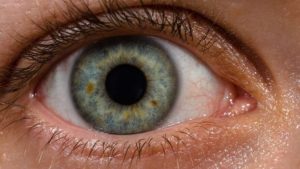(JNS) An Israeli hospital has started recruiting volunteers for the world’s largest known study for the detection of COVID-19 within the surface of the eye, announced Sheba Medical Center at Tel Hashomer on Thursday.

The hospital will be testing if the Tear Film Imager (TFI) developed by the Israeli company AdOM Advanced Optical Technologies, which takes a noninvasive measurement of the tear film, can effectively diagnose and determine if a person is infected with COVID.
The tear film is a thin fluid layer that covers the outer mucosal surfaces of the eye.
TFI quantifies the dynamic properties of the tear-film inner layers using a single non-contact measurement while allowing individuals to blink naturally. The whole measurement process takes about 40 seconds per eye.
The first patient has already been enrolled in the study, which is expected to last 30 days. At least 500 people are expected to participate.
“The world needs new diagnostic tools to help assess aggressive viruses in a non-invasive manner with speed and efficiency,” said AdOM CTO Raanan Gefen. “However, the test also needs to meet the rigors of high sensitivity, which is the hallmark of an approvable diagnostic device. Different SARS variants, as well as aggressive flu variants, are threatening the world population, and we are developing the TFI virus-detection technology for high sensitivity within these large groups.”
Specifically, the study will compare the accuracy of using the TFI to taking a PCR test. If successful, the company would apply for regulatory approval.
“Our goal is to have hundreds of patients who are asymptomatic or symptomatic with COVID-19, irrespective of the variant and even those who have recovered, to see how the TFI device compares to the existing PCR standard of care,” said Professor Eyal Zimlichman, deputy director general and chief transformation officer at Sheba’s ARC Innovation Center and chief investigator of the trial.
A previous proof-of-concept study conducted at Wolfson Medical Center in Holon demonstrated that the TFI could correctly identify COVID or negative patients when compared to a PCR test. The new study will validate the TFI in an “all-comers” setting to see if it continues to be equally as effective as the PCR, while being faster and non-invasive.
As Gefen explained, “if proven to have a high correlation to PCR, this can be a game-changer, as the TFI device can be utilized as a point-of-care diagnostic in many venues such as airports, sporting arenas and businesses that want to have a simple, non-invasive test to determine the status of entering crowds.”
*
Preceding provided by JNS.org